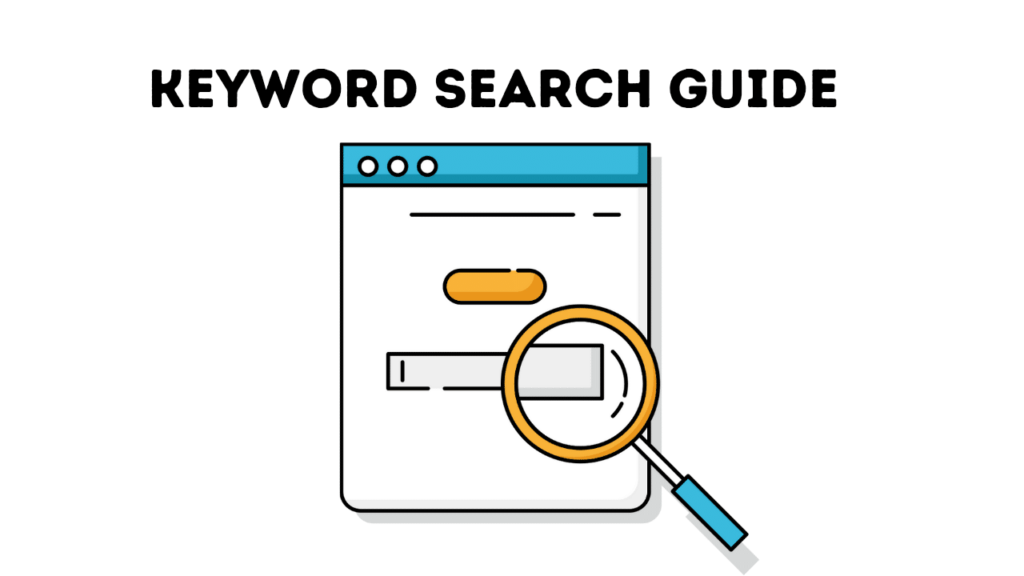
It’s so important that it should be the first thing you do before you even think about writing your content or designing your website. If you skip keyword research, you might as well skip the whole SEO process, because there’s little point in investing time and effort into something no one will find! Here’s an overview of what keyword research entails and how to do it effectively to get your content in front of the right audience online.
The importance of keyword research
Although some SEO experts get started with SEO by building links or optimizing existing content, it’s vital that you begin your on-page optimization efforts with keyword research.
Without knowing which keywords you should target and how many people are searching for those terms, all of your time spent optimizing will be largely wasted. Make sure to focus on long-tail keywords that have little competition and are highly relevant to your niche
Steps To Keyword Researh
1. Understand Your Consumer Keyword search
Understanding your consumer base is one of the most important parts of good keyword research. You can’t expect to capture search volumes if you don’t understand why people would search for certain things.
Knowing what your audience searches allows you to tailor content and make more informed decisions when it comes time to choose keywords. There are a number of ways in which you can get insight into what your consumers might be looking for and why they are searching that way.
2. Understand Your Competition keyword research seo
So now that you know what keywords you want to target, it’s time to start understanding your competition. From here, you can deduce which keywords are easier to rank for and which ones will require a lot more effort. At a high level, here’s how you do it.
Find all of your direct competitors on Google and see what they rank for. make it very easy to do these type of competitor analyses (i.e., research specific keyword rankings directly from major search engines).
Once you have a good list, pick out 2-3 keywords that are within your sweet spot—meaning those that are easier but still highly profitable—and go after them first before moving onto longer-tail opportunities.
3. How to Find the Right Keywords for Your Content
We’ll start with something simple: brainstorming. Try free-writing words related to your niche, product, or service. That way you can think beyond what’s directly on your mind and take advantage of ideas that surprise you. For example, let’s say you run a photography business and are looking for keywords like portrait photographer in San Francisco.
What other words come to mind? How about family portrait photography, senior portraits, or maybe even Bay Area professional photographers? It turns out that there are lots of ways to express what you do—and Google knows how people search. After you brainstorm your keywords go and type the keywords on Google keyword tool or h supertools to see the number of search volumes on certain keywords.
How To Optimize Your Website For SEO with Keyword Research
A website is a digital representation of a company, product, service or person. It is the first place people go to when they are looking for information on a given topic. Optimizing your website for SEO means that you are making sure that it will be found by search engine users when they type in search queries related to your site’s topic.
Keyword research is one of the most important steps in optimizing your site for SEO and it can help you find out what words people are using to find your site. There are many tools available online to help you with keyword research such as Google AdWords Keyword Tool or Keyword Tool by Amazon.
Keyword Tools
There are a number of ways you can go about researching keyword ideas, but here we’ll go over some of our favorite tools.
1. Google’s AdWords Keyword Planner
which can give you a good starting point for your keyword search. You simply enter in two or more relevant phrases (depending on how specific you want to get) and Google will spit back some suggested keywords that relate to your terms.
You also can quickly look at Search volume and Competition, though do note that these metrics are only as good as Google’s algorithm — so if it suggests something irrelevant, don’t trust it, since it might not be getting all of its data from real-world search queries!
2. H Supertools
H SuperTools is a keyword research tool that allows you to research and monitor your competitors’ search engine optimization efforts.it is one of the best keyword to out there.
3. Ahrefs
If you’re looking for a comprehensive keyword research tool, Ahrefs is definitely worth checking out. Ahrefs offers a variety of features, including a keyword discovery tool, a competition analysis tool, and a traffic graph.
One of the best features of Ahrefs is its keyword search tool. You can use this tool to find keywords that are relevant to your business and target audience. Ahrefs also offers a variety of other features, including a competitor analysis tool and a traffic graph.
4. SEMrush
If you’re looking for a tool to help you with your SEO rankings, SEMrush is a great option. This keyword research tool can help you find the right keywords to target, track your current rankings, and measure your website’s competitive landscape.
One of the things I like best about SEMrush is the ability to track your website’s ranking for specific keywords over time. This can help you identify trends and track your progress over time. Additionally, SEMrush can help you identify your competitors and what keywords they are targeting.
Conclusion: Tips on How to Get Started With Keyword Research
Keyword research is one of the most important parts of SEO. It helps you to find out the words your customers are searching for and what they are interested in.
To start with keyword research, you need to identify the main topic of your article. This will help you to find out what keywords you should use in your article. You can also use Google AdWords Keyword Tool or h supertools Free Keyword Tool to get a better idea of what keywords people are using online.
Once you have identified the right keywords, it’s time to make a list of them and start optimizing your content for search engines.














